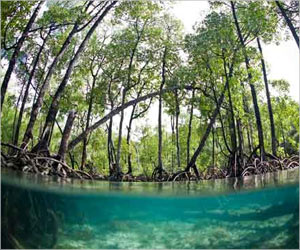The list of moving parts is long, and one part that has until now remained unmeasured is the degree to which deforestation in tropical rainforests like the Amazon and the Congo contributes to additional forest losses because of its effect on regional climate.
“We used Earth system models to quantify what the climate impact from tropical deforestation is today,” said lead author Yue Li, UCI postdoctoral researcher in Earth system science. “Then, we used this information with satellite observations of forest biomass to figure out how nearby forests are responding to these changes.”
Jim Randerson, UCI professor of Earth system science, added: “This paper shows that avoiding deforestation yields carbon benefits in nearby regions as a consequence of climate feedbacks.”
In the Congo, the additional biomass loss from the climate effects of deforestation is about 3.8 percent. Tropical forests store about 200 petagrams of carbon in their aboveground biomass. Since 2010, deforestation has been removing about 1 petagram of that carbon every year. (One petagram is equal to 1 trillion kilograms.)
Until now, climate modelers have, for lack of data, not considered tree mortality in their climate simulations. But by combining satellite data with climate variables, they obtained information about how sensitive carbon stored in vegetation is to climatic changes that result from tree mortality and fire.
Deforestation and Climate Change
“Deforestation has ramifications to forests growing elsewhere, because its consequences to the region’s air temperature and precipitation,” said co-author Paulo Brando, UCI professor of Earth system science. “Until recently, it was very difficult to isolate the effects of deforestation though.”
By developing new estimates of regional carbon losses from deforestation-driven climate change in the Amazon and the Congo, the team provided information that will help scientists fine tune their models. This “might help us design better climate solutions,” Randerson said. By knowing exactly how much biomass is being lost through this activity, he explained, policymakers can make stronger arguments for why it’s worthwhile to curb deforestation, because they can now better describe the knock-on effects.
Joining Brando, Li and Randerson on this project, which was funded by the U.S. Department of Energy Office of Science and NASA, were Dave Lawrence at the National Center for Atmospheric Research and Hui Yang from the Max Planck Institute for Biogeochemistry in Germany.
Source: Eurekalert



